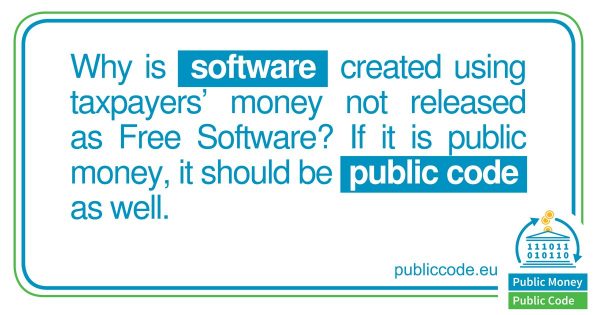Public money? Public code!
Digital services provided and used by public sector organisations are the critical infrastructure of the 21st century. Central and local government agencies must ensure they have full control over systems at the core of our digital infrastructure to establish trustworthy systems. However, this is rarely the case due to restrictive proprietary software licences.
Thirty-one organisations are today publishing an open letter in which they call for lawmakers to advance legislation requiring publicly financed software developed for the public sector be made available under a Free and Open Source Software licence, the Free Software Foundation Europe (FSFE) reports. The initial signatories include CCC, EDRi, Free Software Foundation Europe, KDE, Open Knowledge Foundation Germany, openSUSE, Open Source Business Alliance, Open SourceInitiative, The Document Foundation and Wikimedia Deutschland.
All the signatories are asking individuals and other organisation to sign the open letter, which will be sent to candidates in the forthcoming German parliamentary election and, during the coming months, to other representatives of the EU and EU member states until the 2019 European Parliament elections.

Public institutions spend millions of euros each year on the development of new bespoke software. The public sector’s procurement choices play a significant role in determining which companies are allowed to compete and what software is supported with taxpayers’ money. Public sector organisations often have problems sharing code with each other, even if they fully funded its development. In addition, sensitive personal data on citizens is at risk if there is no option for independent third parties to run audits or other security checks on the code.
FSFE President Matthias Kirschner says:
We need software that fosters the sharing of good ideas and solutions. Only like this will we be able to improve digital services for people all over Europe. We need software that guarantees freedom of choice, access, and competition. We need software that helps public administrations regain full control of their critical digital infrastructure, allowing them to become and remain independent from a handful of companies. Public bodies are financed through taxes. They should spend funds responsibly and in the most efficient way possible. If it is public money, it should be public code as well!”